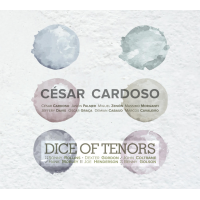Home » Jazz Articles » Album Review » César Cardoso: Dice of Tenors
César Cardoso: Dice of Tenors
Fierce rhythmic drive and underlying arpeggiated patterns are defining compositional tools with which Cardoso approaches arrangements on this record. His take on Golson's "Along Came Betty" is representative of this aspect. Vibes and piano build the harmonic frame with broken up chord patterns while restless drums push the envelope and add unfamiliarity to a well-known tune. The vast and colorful new possibilities that come with leading an octet breathe fresh life into each and every bar of this endeavor. Irving Berlin's "Remember" is treated to an equal amount of traditional and modern interpretation, shining a light on Jason Palmer's brash trumpet snarls in interplay with constant rhythm changes and modest sax and trombone flourish.
The balladic stride of Cardoso's own "Rafaela" hands each soloist a spot in the sunlight, while funk-injected "Three O'clock in The Morning" sees trombonist Massimo Morganti trading lines with a lively rhythm section. Throughout the album the extent of instrumentation and arrangement is never saturated, but carefully assembled and constructed, leaving breathing room for solos and an overall dynamic sonic experience. Occasionally the rehashing of themes and motifs tends to raise a slightly monotonous effect—especially on text-book cuts such as "Giant Steps." For the most part however, the band introduce plenty of new elements to keep things interesting and vibrant.
Brilliant performances and tight interplay enhance the conviction with which this music resonates while simultaneously adding sturdy physicality to the delivery. With that in mind, Henderson's breezy "Recorda-Me" is turned into a stringent affair, showcasing Cardoso's knowledgeable vocabulary and phrasing throughout an extensive curve of chord progressions. McCoy Tyner's role in the original recording on Page One (Blue Note, 1963) is distributed over keys and vibes, taking on a much more robust form of accompaniment with Jeffery Davis on vibraphone breaking loose in various places.
None of the music on Dice of Tenors strictly breaks new ground in a revolutionary way. What the album does however, is provide a fine demonstration of strong craftsmanship and state-of-the-art arranging. Topped-off by splendid performances, this record proves a very worthy addition to contemporary medium-large ensemble releases.
Track Listing
Along Came Betty; Remember; Rafaela; Three O'Clock In The Morning; Giant Steps; Recorda-Me; Agueiro; St. Thomas.
Personnel
César Cardoso
saxophoneJason Palmer
trumpetMiguel Zenon
saxophone, altoMassimo Morganti
tromboneJeffery Davis
vibraphoneOscar Graça
pianoDemian Cabaud
bass, acousticMarcos Cavaleiro
drumsAlbum information
Title: Dice of Tenors | Year Released: 2020 | Record Label: Self Produced
Tags
PREVIOUS / NEXT
Support All About Jazz
 All About Jazz has been a pillar of jazz since 1995, championing it as an art form and, more importantly, supporting the musicians who make it. Our enduring commitment has made "AAJ" one of the most culturally important websites of its kind, read by hundreds of thousands of fans, musicians and industry figures every month.
All About Jazz has been a pillar of jazz since 1995, championing it as an art form and, more importantly, supporting the musicians who make it. Our enduring commitment has made "AAJ" one of the most culturally important websites of its kind, read by hundreds of thousands of fans, musicians and industry figures every month.
























